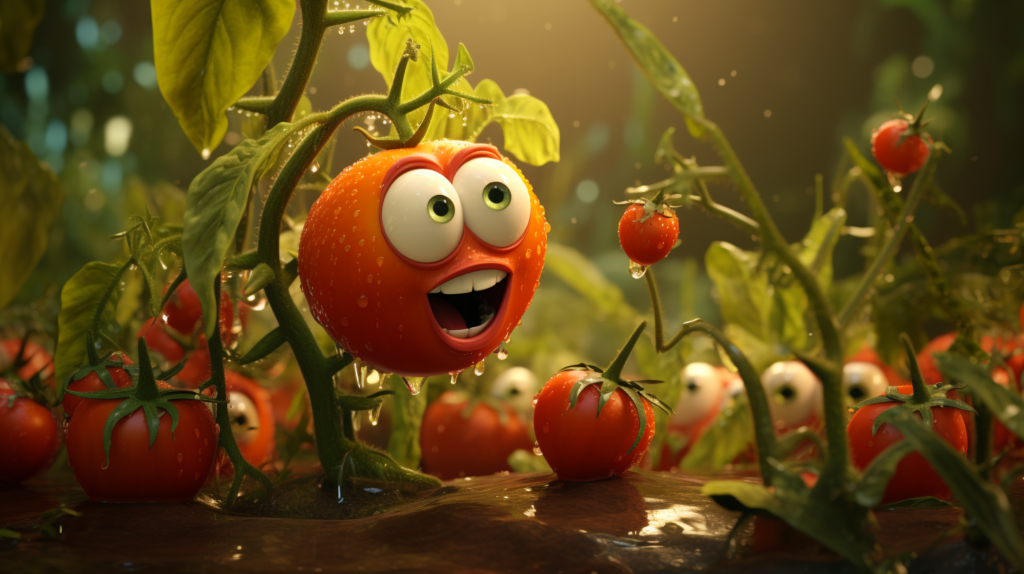Neste vídeo do canal do Youtube TED-Ed, explora-se o sofisticado sistema de defesa das plantas. O vídeo aborda como as plantas utilizam defesas físicas e químicas contra uma variedade de ameaças, desde insetos a herbívoros grandes. Ele oferece insights sobre as estratégias de comunicação entre plantas e a formação de alianças com outras espécies para a autodefesa.
| Audio | |
|---|---|
Normal | Slow |
| English Transcript | Tradução |
| This is a tomato plant, and this is an aphid slowly killing the tomato plant by sucking the juice out of its leaves. | Esta é uma planta de tomate, e este é um pulgão que está matando lentamente a planta de tomate ao sugar o suco de suas folhas. |
| The tomato is putting up a fight using both physical and chemical defenses to repel the attacking insects. | O tomate está resistindo usando defesas físicas e químicas para repelir os insetos atacantes. |
| But that's not all. | Mas não é só isso. |
| The tomato is also releasing compounds that signal nearby tomato plants to release their own insect repellent. | O tomate também está liberando compostos que sinalizam para as plantas de tomate próximas liberarem seu próprio repelente de insetos. |
| Plants are constantly under attack. | As plantas estão constantemente sob ataque. |
| They face threats ranging from microscopic fungi and bacteria, small herbivores, like aphids, caterpillars, and grasshoppers, up to large herbivores, like tortoises, koalas, and elephants. | Elas enfrentam ameaças que vão desde fungos microscópicos e bactérias, pequenos herbívoros, como pulgões, lagartas e gafanhotos, até grandes herbívoros, como tartarugas, coalas e elefantes. |
| All are looking to devour plants to access the plentiful nutrients and water in their leaves, stems, fruits, and seeds. | Todos procuram devorar as plantas para acessar os abundantes nutrientes e água em suas folhas, caules, frutos e sementes. |
| But plants are ready with a whole series of internal and external defenses that make them a much less appealing meal, or even a deadly one. | Mas as plantas estão preparadas com uma série inteira de defesas internas e externas que as tornam uma refeição muito menos atraente, ou até mesmo mortal. |
| Plants' defenses start at their surface. | As defesas das plantas começam em sua superfície. |
| The bark covering tree trunks is full of lignin, a rigid web of compounds that's tough to chew and highly impermeable to pathogens. | A casca que cobre os troncos das árvores está cheia de lignina, uma teia rígida de compostos que é difícil de mastigar e altamente impermeável a patógenos. |
| Leaves are protected by a waxy cuticle that deters insects and microbes. | As folhas são protegidas por uma cutícula cerosa que repele insetos e micróbios. |
| Some plants go a step further with painful structures to warn would-be predators. | Algumas plantas vão além, com estruturas dolorosas para advertir os predadores em potencial. |
| Thorns, spines, and prickles discourage bigger herbivores. | Espinhos, acúleos e picos desencorajam herbívoros maiores. |
| To deal with smaller pests, some plants' leaves have sharp hair-like structures called trichomes. | Para lidar com pragas menores, algumas plantas têm estruturas semelhantes a pelos afiados chamadas tricomas. |
| The kidney bean plant sports tiny hooks to stab the feet of bed bugs and other insects. | A planta de feijão possui pequenos ganchos para perfurar os pés de percevejos e outros insetos. |
| In some species, trichomes also dispense chemical irritants. | Em algumas espécies, os tricomas também dispensam irritantes químicos. |
| Stinging nettles release a mixture of histamine and other toxins that cause pain and inflammation when touched. | Urtigas liberam uma mistura de histamina e outras toxinas que causam dor e inflamação ao toque. |
| For other plant species, the pain comes after an herbivore's first bite. | Para outras espécies de plantas, a dor vem após a primeira mordida do herbívoro. |
| Spinach, kiwi fruit, pineapple, fuchsia and rhubarb all produce microscopic needle-shaped crystals called raphides. | Espinafre, kiwi, abacaxi, fúcsia e ruibarbo todos produzem cristais microscópicos em forma de agulha chamados ráfides. |
| They can cause tiny wounds in the inside of animals' mouths, which create entry points for toxins. | Eles podem causar pequenas feridas no interior da boca dos animais, que criam pontos de entrada para toxinas. |
| The mimosa plant has a strategy designed to prevent herbivores from taking a bite at all. | A planta mimosa tem uma estratégia projetada para impedir que herbívoros sequer mordam. |
| Specialized mechanoreceptor cells detect touch and shoot an electrical signal through the leaflet to its base causing cells there to release charged particles. | Células mecanorreceptoras especializadas detectam o toque e enviam um sinal elétrico através do folíolo até sua base, fazendo com que as células ali liberem partículas carregadas. |
| The buildup of charge draws water out of these cells and they shrivel, pulling the leaflet closed. | O acúmulo de carga retira água dessas células e elas murcham, puxando o folíolo para fechar. |
| The folding movement scares insects away and the shrunken leaves look less appealing to larger animals. | O movimento de dobragem assusta os insetos e as folhas encolhidas parecem menos atraentes para animais maiores. |
| If these external defenses are breached, the plant immune system springs into action. | Se essas defesas externas são violadas, o sistema imunológico da planta entra em ação. |
| Plants don't have a separate immune system like animals. | As plantas não têm um sistema imunológico separado como os animais. |
| Instead, every cell has the ability to detect and defend against invaders. | Em vez disso, cada célula tem a capacidade de detectar e se defender contra invasores. |
| Specialized receptors can recognize molecules that signal the presence of dangerous microbes or insects. | Receptores especializados podem reconhecer moléculas que sinalizam a presença de micróbios ou insetos perigosos. |
| In response, the immune system initiates a battery of defensive maneuvers. | Em resposta, o sistema imunológico inicia uma série de manobras defensivas. |
| To prevent more pathogens from making their way inside, the waxy cuticle thickens and cell walls get stronger. | Para impedir que mais patógenos entrem, a cutícula cerosa se engrossa e as paredes celulares se fortalecem. |
| Guard cells seal up pores in the leaves. | Células de guarda fecham os poros nas folhas. |
| And if microbes are devouring one section of the plant, those cells can self-destruct to quarantine the infection. | E se micróbios estão devorando uma seção da planta, essas células podem se autodestruir para quarentenar a infecção. |
| Compounds toxic to microbes and insects are also produced, often tailor-made for a specific threat. | Compostos tóxicos para micróbios e insetos também são produzidos, muitas vezes feitos sob medida para uma ameaça específica. |
| Many of the plant molecules that humans have adopted as drugs, medicines and seasonings evolved as part of plants' immune systems because they're antimicrobial, or insecticidal. | Muitas das molécThe_amazing_ways_plants_defend_themselves.htmlulas vegetais que os humanos adotaram como drogas, medicamentos e temperos evoluíram como parte dos sistemas imunológicos das plantas porque são antimicrobianos ou inseticidas. |
| An area of a plant under attack can alert other regions using hormones, airborne compounds, or even electrical signals. | Uma área de uma planta sob ataque pode alertar outras regiões usando hormônios, compostos no ar ou até sinais elétricos. |
| When other parts of the plant detect these signals, they ramp up production of defensive compounds. | Quando outras partes da planta detectam esses sinais, elas aumentam a produção de compostos defensivos. |
| And for some species, like tomatoes, this early warning system also alerts their neighbors. | E para algumas espécies, como os tomates, esse sistema de alerta precoce também alerta os vizinhos. |
| Some plants can even recruit allies to adopt a strong offense against their would-be attackers. | Algumas plantas podem até recrutar aliados para adotar uma ofensiva forte contra seus atacantes em potencial. |
| Cotton plants under siege by caterpillars release a specific cocktail of ten to twelve chemicals into the air. | Plantas de algodão sob cerco de lagartas liberam um coquetel específico de dez a doze produtos químicos no ar. |
| This mixture attracts parasitic wasps that lay eggs inside the caterpillars. | Essa mistura atrai vespas parasitas que depositam ovos dentro das lagartas. |
| Plants may not be able to flee the scene of an attack, or fight off predators with teeth and claws, but with sturdy armor, a well-stocked chemical arsenal, a neighborhood watch, and cross-species alliances, a plant isn't always an easy meal. | As plantas podem não ser capazes de fugir da cena de um ataque ou lutar contra predadores com dentes e garras, mas com uma armadura resistente, um arsenal químico bem abastecido, uma vigilância comunitária e alianças entre espécies, uma planta nem sempre é uma refeição fácil. |
Contagem de palavras
A tabela abaixo exibe as palavras encontradas nesta vídeo, bem como o número de vezes em que aparecem.
Veja também: Para que serve esta tabela?
| Freq. | Palavra | Freq. | Palavra | Freq. | Palavra |
|---|---|---|---|---|---|
| 30 | the | 26 | and | 21 | to |
| 20 | a | 19 | of | 12 | plants |
| 11 | plant | 9 | that | 8 | is |
| 8 | are | 6 | their | 6 | leaves |
| 6 | insects | 6 | an | 5 | with |
| 5 | tomato | 5 | they | 5 | some |
| 5 | other | 5 | or | 5 | like |
| 5 | in | 5 | compounds | 5 | cells |
| 5 | can | 4 | up | 4 | this |
| 4 | system | 4 | species | 4 | release |
| 4 | not | 4 | microbes | 4 | immune |
| 4 | herbivores | 4 | for | 4 | defenses |
| 4 | also | 4 | all | 3 | under |
| 3 | these | 3 | signal | 3 | inside |
| 3 | have | 3 | from | 3 | even |
| 3 | detect | 3 | chemical | 3 | caterpillars |
| 3 | by | 3 | but | 3 | be |
| 3 | attack | 3 | animals | 2 | would |
| 2 | when | 2 | waxy | 2 | water |
| 2 | using | 2 | trichomes | 2 | toxins |
| 2 | tiny | 2 | structures | 2 | specific |
| 2 | specialized | 2 | signals | 2 | prevent |
| 2 | predators | 2 | pathogens | 2 | pain |
| 2 | out | 2 | one | 2 | molecules |
| 2 | mixture | 2 | microscopic | 2 | meal |
| 2 | less | 2 | leaflet | 2 | its |
| 2 | into | 2 | if | 2 | has |
| 2 | fight | 2 | external | 2 | electrical |
| 2 | defensive | 2 | cuticle | 2 | cell |
| 2 | cause | 2 | called | 2 | bite |
| 2 | at | 2 | as | 2 | appealing |
| 2 | against | 1 | wounds | 1 | whole |
| 1 | which | 1 | well | 1 | web |
| 1 | way | 1 | watch | 1 | wasps |
| 1 | warning | 1 | warn | 1 | walls |
| 1 | twelve | 1 | trunks | 1 | tree |
| 1 | toxic | 1 | tough | 1 | touched |
| 1 | touch | 1 | tortoises | 1 | tomatoes |
| 1 | through | 1 | threats | 1 | threat |
| 1 | those | 1 | thorns | 1 | thickens |
| 1 | there | 1 | them | 1 | ten |
| 1 | teeth | 1 | taking | 1 | tailor |
| 1 | systems | 1 | surface | 1 | sucking |
| 1 | sturdy | 1 | stronger | 1 | strong |
| 1 | strategy | 1 | stocked | 1 | stinging |
| 1 | step | 1 | stems | 1 | start |
| 1 | stab | 1 | springs | 1 | sports |
| 1 | spines | 1 | spinach | 1 | smaller |
| 1 | small | 1 | slowly | 1 | siege |
| 1 | shrunken | 1 | shrivel | 1 | shoot |
| 1 | sharp | 1 | shaped | 1 | series |
| 1 | separate | 1 | self | 1 | seeds |
| 1 | section | 1 | seasonings | 1 | seal |
| 1 | scene | 1 | scares | 1 | s |
| 1 | rigid | 1 | rhubarb | 1 | response |
| 1 | repellent | 1 | repel | 1 | releasing |
| 1 | regions | 1 | recruit | 1 | recognize |
| 1 | receptors | 1 | ready | 1 | raphides |
| 1 | ranging | 1 | ramp | 1 | quarantine |
| 1 | putting | 1 | pulling | 1 | protected |
| 1 | production | 1 | produced | 1 | produce |
| 1 | prickles | 1 | presence | 1 | pores |
| 1 | points | 1 | plentiful | 1 | pineapple |
| 1 | physical | 1 | pests | 1 | parts |
| 1 | particles | 1 | part | 1 | parasitic |
| 1 | painful | 1 | own | 1 | often |
| 1 | offense | 1 | off | 1 | nutrients |
| 1 | nettles | 1 | neighbors | 1 | neighborhood |
| 1 | needle | 1 | nearby | 1 | much |
| 1 | movement | 1 | mouths | 1 | more |
| 1 | mimosa | 1 | medicines | 1 | mechanoreceptor |
| 1 | may | 1 | many | 1 | maneuvers |
| 1 | making | 1 | make | 1 | made |
| 1 | looking | 1 | look | 1 | lignin |
| 1 | lay | 1 | larger | 1 | large |
| 1 | koalas | 1 | kiwi | 1 | killing |
| 1 | kidney | 1 | juice | 1 | irritants |
| 1 | invaders | 1 | internal | 1 | instead |
| 1 | insecticidal | 1 | insect | 1palavras.html | initiates |
| 1 | inflammation | 1 | infection | 1 | impermeable |
| 1 | humans | 1 | hormones | 1 | hooks |
| 1 | histamine | 1 | highly | 1 | herbivore |
| 1 | hair | 1 | guard | 1 | grasshoppers |
| 1 | go | 1 | get | 1 | further |
| 1 | fungi | 1 | full | 1 | fuchsia |
| 1 | fruits | 1 | fruit | 1 | folding |
| 1 | flee | 1 | first | 1 | feet |
| 1 | face | 1 | evolved | 1 | every |
| 1 | entry | 1 | elephants | 1 | eggs |
| 1 | easy | 1 | early | 1 | drugs |
| 1 | draws | 1 | do | 1 | dispense |
| 1 | discourage | 1 | devouring | 1 | devour |
| 1 | deters | 1 | destruct | 1 | designed |
| 1 | defend | 1 | deal | 1 | deadly |
| 1 | dangerous | 1 | crystals | 1 | cross |
| 1 | create | 1 | covering | 1 | cotton |
| 1 | constantly | 1 | comes | 1 | cocktail |
| 1 | closed | 1 | claws | 1 | chew |
| 1 | chemicals | 1 | charged | 1 | charge |
| 1 | causing | 1 | buildup | 1 | bugs |
| 1 | breached | 1 | both | 1 | bigger |
| 1 | bed | 1 | because | 1 | bean |
| 1 | battery | 1 | base | 1 | bark |
| 1 | bacteria | 1 | away | 1 | attracts |
| 1 | attacking | 1 | attackers | 1 | arsenal |
| 1 | armor | 1 | area | 1 | aphids |
| 1 | aphid | 1 | antimicrobial | 1 | always |
| 1 | allies | 1 | alliances | 1 | alerts |
| 1 | alert | 1 | airborne | 1 | air |
| 1 | after | 1 | adopted | 1 | adopt |
| 1 | action | 1 | access | 1 | able |
| 1 | ability |










